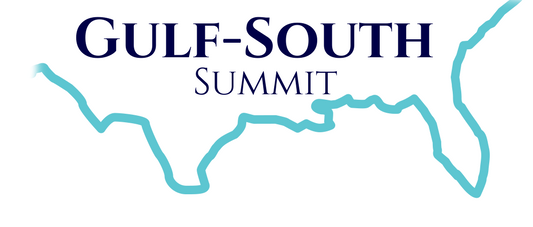We are now accepting nominations for the 2025 Gulf South Summit on Service-Learning and Community Engagement in Higher Education Awards. Please submit a nomination for one or more of the 2025 Gulf South Summit Award Categories below.
Outstanding Practitioner Contributions to Service-Learning in Higher Education
The Gulf-South Summit Award for Outstanding Practitioner Contributions to Service-Learning in Higher Education will be given to a practitioner (staff member, or administrator with responsibility for administration and/or coordination of service-learning activities) who has demonstrated excellence in creating, implementing, and sustaining opportunities for engaging college/university students in service-learning.
Evaluation criteria are as follows:
- Advancement of a culture of engagement within their institution
- Demonstrated leadership in the field of civic engagement
- Advancement of the principles of effective practice
- Demonstration of program growth and sustainability over time
- Evidence of impacts on students, campus, and community
Outstanding Community Partner Contributions to Service-Learning in Higher Education
The Gulf-South Summit Award for Outstanding Community Partner Contributions to Service-Learning will be given to an individual who has demonstrated excellence in creating and sustaining opportunities for engaging college/university students in service-learning. This individual should have collaborated with a service-learning program for more than one year in order to be nominated.
Evaluation criteria are as follows:
- Evidence of having an active voice in the planning and implementation of service-learning
- Evidence of benefits to students
- Demonstration of effort in sustaining the collaboration over time
Outstanding Faculty Contributions to Service-Learning in Higher Education – Instruction
The Gulf-South Summit Award for Outstanding Faculty Contributions to Service-Learning will be given to a member of the teaching faculty who has demonstrated excellence incorporating service-learning pedagogy in the college/university classroom.
Evaluation criteria are as follows:
- Demonstration of engaged teaching methodologies
- Evidence of benefits to students
- Evidence of collaboration with community partners and/or service beneficiaries in course design
- Demonstration of sustained commitment by incorporating service-learning consistently for a least three academic terms.
Outstanding Faculty Contributions to Service-Learning in Higher Education – Research
The Gulf-South Summit Award for Outstanding Faculty Contributions to Service-Learning will be given to a faculty member who has demonstrated excellence in the scholarship of engagement. The Gulf-South Summit accepts nominations for: (1) research on the teaching and learning of service-learning and (2) community engaged research.
Evaluation criteria are as follows:
- Evidence of significant contribution to research in the field
- Example(s) of recent relevant scholarly activity/publication
- Promotion/support of scholarship of engagement or of scholarship of teaching and learning of service-learning among their colleagues
Outstanding Student Contributions to Service-Learning in Higher Education
The Gulf-South Summit Award for Outstanding Student Contributions to Service-Learning will be given to a full or part-time undergraduate or graduate student who has demonstrated extraordinary public or community service efforts while attending an institution of higher education.
Evaluation criteria are as follows:
- Evidence of the effects of their service-learning participation on the community
- Evidence of the effects of service-learning participation on their academic learning, civic commitment, community awareness, and personal development
- Evidence of how service-learning efforts have furthered the mission of their institution
- Demonstrated innovative and sustained work to address an issue in the community
Outstanding Service-Learning Collaboration in Higher Education
The Gulf-South Summit Award for Outstanding Service-Learning Collaboration will be given to a team of practitioners, faculty, and community partners who have demonstrated success in achieving a mutually beneficial collaboration that has successfully addressed a genuine community need.
Evaluation criteria are as follows:
- Evidence of a formalized relationship between community organizations and a college/university. This may include a copy of a Memorandum of Understanding or a Letter of Partnership outlining the commitments of each stakeholder.
- Evidence of the beneficial impact of the collaboration on local concerns
- Indication of how the collaboration advanced objectives of engaged scholarship in the college or university
- Evidence that the collaboration has been sustained for at least three years

